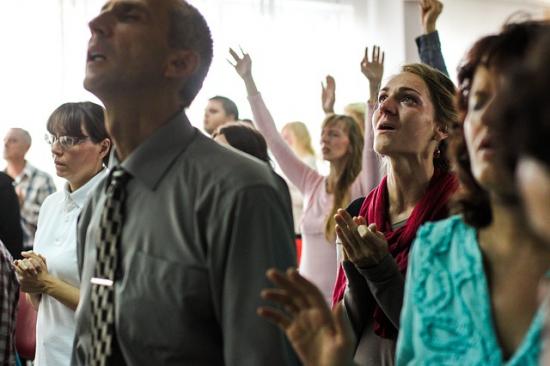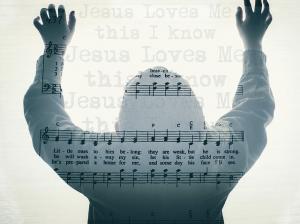
Singing is synonymous with Sunday morning worship. No matter your denomination, the two constants you’ll find in nearly every worship service are singing and preaching. Churches vary on whether or how often they recite creeds, host Sunday School or observe communion, but these two are integral parts of the worship experience.
It’s easy to think that singing is just a warm-up act that plays a less important role in our services and spiritual lives than the sermon. When I was entrenched deeply in Reformed circles, I had several friends make that argument; I was probably fond of it, too. We gathered, we said, to hear from the Word. You could get rid of the singing and still have a worship service; you couldn’t get rid of the preaching and call it church.
But singing is more essential to our spiritual lives than we often believe. It’s how Moses, David and Mary celebrated God’s work in their lives and how the Jewish people commemorated their pilgrimages to Jerusalem. We have entire books of the Bible dedicated to songs. In Ephesians, Paul encourages us to sing together. Singing has long been part of the Christian tradition; we are a religion of song.
Which is why it’s disheartening when I look around church and see people standing up during worship with their arms crossed (or even sitting down, sometimes staring at their bulletin or phone). This isn’t a dig at my church in particular; this is something I’ve noticed at every church I’ve been a part of. I’ll also just toss out there that, 9 out of 10 times, it’s men not participating in the singing.
This saddens me. It’s not just that I like singing or that it’s long been a part of our tradition. It’s that, the older I get, the more I see our participation in communal worship as an important part of serving each other, sharing the Gospel and engaging in the Church.
Here are five reasons why that participation is so important.
Worship promotes vulnerability
I think one of the main reasons we remain silent in service is the same reason many people never attempt karaoke: We’re embarrassed. Maybe we’re afraid of how our voice sounds; maybe we just realize that singing songs of love and praise to God makes us seem a bit soft. Our culture puts a ridiculous premium on men being strong, silent and unemotional. Sadly, this is still prevalent inside many churches, even though it was never the model set by Christ. When we openly and emotionally praise God, we make ourselves vulnerable.
That openness is essential to worship. The heart of worship is recognizing God’s greatness and my weakness, responding in awe to His character. As it’s often been said, worship is “all that I am responding to all that He is.” That requires an awareness of the depth of my sin and the greatness of the one who saves. Vulnerability unlocks worship.
It is also essential to community. Corporate worship is when we come together with fellow believers to praise God together and commit to edifying, encouraging and challenging one another. The only way we can do this is if we trust one another. The vulnerability of singing is a way we let down our walls. The great singers humble themselves by being another voice among many; the not-so-great make a joyful noise, knowing that no one thinks less of them because of their off-key renditions or pitchy choruses. Singing together creates community.
Worship is calibration

Another reason we don’t sing is because we’re just not feeling in a worshipful mindset. And believe me, I get it.
Sunday mornings are not the finest hour in the Williams house. No matter what time we wake up, it never seems to be enough time to eat, shower and get two kids ready. By the time we hit the door, chances are good that my wife or I have lost our tempers with each other, the kids or the dog. We race down the road trying to beat the clock. We have just enough time to get the little one to the nursery and put on some fake smiles so we’ll look happy and holy as we plop down in our pews. Many Sundays, I’ll be honest, I’d much rather be in bed than in church.
And it’s not just the rush of Sunday mornings that puts up a barrier to worship. We often come into church carrying a week’s worth of doubts, discouragements, frustrations and fears. We sit in our pews struggling with illness, unemployment, divorce and uncertainty. Maybe we’re not sure if we even believe the words on the screen.
I once heard someone say that when they say the creeds at church, they’re not confessing the things they believe but the things they hope to believe. It’s the same with our singing. I might walk into church not feeling like the words “Oh Happy Day” are true or feel like I’m in much of a mood to praise a God who’s led me through a difficult week. There’s a certain “fake it ‘til you make it” aspect of worship, where we sing the words not because they’re the overflow of our heart but because they’re tuning our souls. We come in empty, trusting God to fill us. We worship not because we feel like it but because we know that there is a truth deeper than our feelings. Worship calibrates our hearts to where they need to be and prepares us to receive the Word.
Worship encourages the suffering
That said, sometimes the load people bear simply won’t be lifted during the service. The curse is too much that day, the aches, fears and turmoil burying a person even as joyful songs surround them. It’s all they can do to show up, shuffle quietly into their pew and leave before making watery eye contact with anyone else.
That’s when we need to sing for them. Our voices are reminders that they don’t bear their burdens alone, and that we will carry them to Jesus when they’re too weak to walk. We surround them with the reminders that they are part of a community that cares for them. Most importantly, we remind them that while they do not feel like singing now that there’s still a truth worth singing about. I’d also say it’s a reason why we need to make songs of lament, confession and questioning part of our rotation on Sundays.
I’ve heard many people talk about how they can do church from home, listening to sermons online and singing in their car. But they miss the essential, communal nature of the Church and the truth that we come together to support one another, lift one another up, celebrate the good times together and weather the bad times side by side. Our worship is proof that we are in this together.
Worship teaches our children

When my son turned 4, he aged out of the nursery. For the last two years, he’s accompanied my wife and me into our morning service until he is dismissed for children’s church during the sermon.
It’s not always a delightful experience. Like any kid, Mickey gets fidgety if there’s too much talking. He tries to play games on our phone or goof around with other kids around him. But for the most part he sits well and behaves. And what I’ve learned over the last two years is that he’s watching.
Mickey’s an inquisitive kid, and he’s taken a deep interest in spiritual matters. Whenever music is on in the car, he asks if the songs are about God. On the Sundays when we take communion, he wants to know what’s up with the grape juice and crackers. He’s even a bit worried about what will happen if he gets married and his wife doesn’t know God. We haven’t introduced these subjects to him; he’s simply developed these questions from observing us.
Parents have a responsibility to teach their children how to worship. The most effective way is for our kids to study us. What does a child learn if Dad isn’t singing or is looking at his phone during the service? He learns that worship is unimportant. What does he learn if he sees several men in the congregation sitting silent, arms crossed and not participating? He learns that this is a sham, not something to be engaged in wholeheartedly. We sing not just to worship God but to teach that He is worthy of that worship.
Worship is evidence of our faith
And what of the curious who come into our sanctuaries searching for evidence of something more to this life? As they sit in the pew, what must they think to hear songs about an awesome God, freedom from death and eternal hope, only to see us sit silent and stone-faced?
We don’t sing because God needs our worship. We sing because He deserves it. Our participation reveals our beliefs. When we belt out a song of praise to God from the depth of our souls, that says something about the worth of what we believe. Granted, our exuberant participation can be faked and our silent stewing can mask deep spiritual conviction. But by and large, there’s a sermon being preached through your worship about whether the faith you claim has made a difference in our lives.
I’ll go one better and say the level of your involvement speaks loudly. We all have different styles of worshiping; when we sing, I’m more calm and collected and my wife is emotional. But I hope sincerity shines through. There’s nothing worse than a congregation singing “Oh Happy Day” with no smiles on their faces, no hands raised, no passion in their voices. To my shame, even though I sing, I don’t always let emotion or conviction fill my worship. For those watching, what am I displaying? A faith that just prompts me to rote obedience? That’s not worship; it’s servitude.
Worship is voluntary. It is emotional. It asks us to be all-in as we approach the throne of God. Our actions on Sunday mornings often speak volumes more than any sermon every will, with a message that rings deeper than the finest hymn stanzas ever written. We preach a message when we worship — what will yours proclaim?












